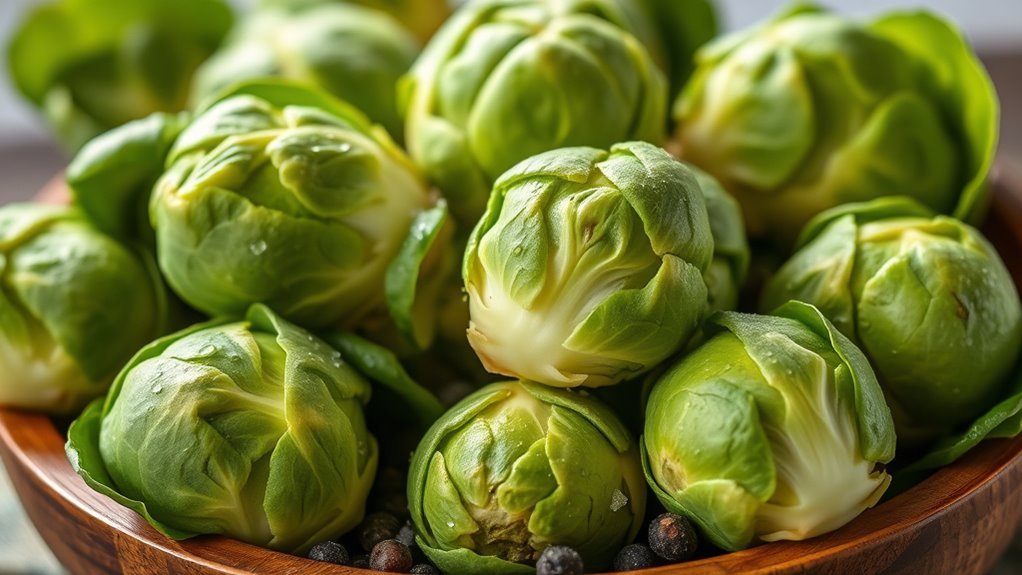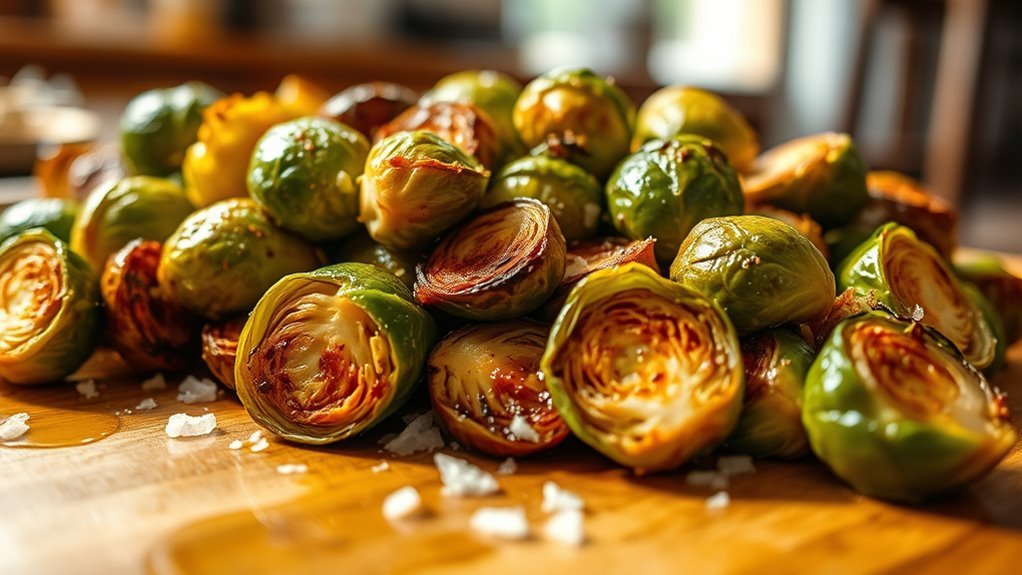Yes, you can have Brussels sprouts on keto! They’re low in net carbs—about 4 grams per cup when you account for fiber—making them a great option for your meals. Rich in vitamins C and K, and packed with antioxidants, they support your overall health while fitting into your daily carb limits. Plus, there are various delicious ways to prepare them. Stick around to discover more benefits and tasty meal prep ideas with Brussels sprouts!
Nutritional Benefits of Brussels Sprouts

When you incorporate Brussels sprouts into your keto diet, you’re not just adding a flavorful vegetable; you’re also reaping significant nutritional benefits. These little green gems are packed with essential vitamins and minerals, including vitamin C, vitamin K, and folate, which support your immune system and promote overall health. Their antioxidant properties play an important role in protecting your cells from oxidative stress, helping to reduce inflammation in your body. Additionally, Brussels sprouts are high in fiber, which aids digestion and can help you feel fuller longer, making it easier to stick to your keto lifestyle. By choosing Brussels sprouts, you’re not only enhancing your meals but also investing in your health and well-being.
Carb Content in Brussels Sprouts

When considering Brussels sprouts for a keto diet, it is crucial to understand their carb content. A typical serving contains about 5 grams of carbohydrates, which can fit within your daily limits. This moderate carb count allows you to enjoy their benefits without greatly impacting your ketosis.
Nutritional Profile Overview
Brussels sprouts are a nutrient-dense vegetable that fits well into a ketogenic diet, primarily due to their low carbohydrate content. They not only provide essential nutrients but also offer health benefits that support your keto lifestyle. Here’s a quick look at their nutritional density:
- Fiber: A great source, which aids digestion.
- Vitamins: Rich in Vitamin C and Vitamin K, vital for maintaining bone health and immune function.
- Minerals: Contains potassium and manganese, important for metabolic processes.
- Antioxidants: Packed with compounds that help fight inflammation and oxidative stress.
Including Brussels sprouts in your meals can enhance your nutrition while keeping carbs in check, giving you the freedom to enjoy a flavorful, healthy diet.
Carb Count Per Serving
A typical serving of Brussels sprouts, which is about one cup (approximately 88 grams), contains roughly 8 grams of carbohydrates. When considering your carb intake on a keto diet, understanding these measurements is vital.
Here’s a quick overview of the carb content based on different serving sizes:
| Serving Size (g) | Total Carbs (g) | Net Carbs (g) |
|---|---|---|
| 100 | 9 | 7 |
| 88 | 8 | 6 |
| 50 | 5 | 4 |
| 200 | 16 | 14 |
| 75 | 7 | 5 |
Using proper carb measurement techniques and keeping serving size considerations in mind will help you enjoy Brussels sprouts while staying on track with your keto goals.
Impact on Ketosis
While you might be tempted to indulge in Brussels sprouts due to their nutritional benefits, their carbohydrate content can influence your state of ketosis. Understanding the ketosis effects is essential in maintaining your desired low-carb lifestyle. Here’s what you need to evaluate about vegetable absorption and Brussels sprouts:
- Carb Count: Each cup has about 8 grams of carbs, which can add up.
- Fiber Content: They also contain fiber, reducing net carbs to about 4 grams per cup.
- Serving Size: Monitor your portion to stay within your daily carb limit.
- Individual Tolerance: Everyone’s body reacts differently, so track your ketone levels.
Balancing these factors helps you enjoy Brussels sprouts while staying in ketosis.
How Brussels Sprouts Fit Into a Keto Diet

When considering options for a keto diet, you might be pleased to find that Brussels sprouts can be a nutritious addition. Their impressive nutrient profile includes fiber, vitamins C and K, and antioxidants, making them a great choice for your meals. With a low carbohydrate count—around 4 grams per cup—Brussels sprouts exhibit excellent keto compatibility, allowing you to enjoy them without compromising your carb limits.
Moreover, their fiber content can help with digestion and promote satiety, which is essential when you’re aiming to maintain a ketogenic lifestyle. By incorporating Brussels sprouts into your diet, you not only enhance flavor but also add valuable nutrients. So, feel free to enjoy these versatile veggies while staying true to your keto journey!
Cooking Methods for Keto-Friendly Brussels Sprouts
Brussels sprouts can be prepared in various ways that complement their keto-friendly profile. You have several delicious options to explore, each highlighting their unique flavor and texture:
- Sautéed Sprouts: Cook them in olive oil or butter with garlic for a quick, flavorful side dish.
- Roasted Sprouts: Toss them with olive oil, salt, and pepper, then roast at high heat to achieve a crispy exterior and tender interior.
- Steamed Sprouts: Lightly steam them to maintain their nutrients while keeping them tender-crisp.
- Grilled Sprouts: Skewer halved sprouts and grill them for a smoky flavor that pairs well with your favorite keto protein.
These methods not only enhance the taste but also keep your meal plan aligned with your keto goals. Enjoy!
Delicious Keto Recipes Featuring Brussels Sprouts
If you’re looking to incorporate Brussels sprouts into your keto meal plan, there are plenty of delicious recipes that make the most of this nutrient-dense vegetable. One popular option is a Brussels Sprouts Salad, which combines shredded sprouts with avocado, nuts, and a tangy dressing for a revitalizing dish. Alternatively, Roasted Brussels Sprouts, seasoned with olive oil and garlic, can serve as a perfect side dish packed with flavor.
Here’s a quick reference table for some tasty ideas:
| Recipe | Key Ingredients |
|---|---|
| Brussels Sprouts Salad | Shredded sprouts, avocado, nuts |
| Roasted Brussels Sprouts | Olive oil, garlic, salt |
| Brussels Sprouts Stir-Fry | Soy sauce, sesame oil, veggies |
Enjoy exploring these options while staying keto-friendly!
Comparing Brussels Sprouts With Other Low-Carb Vegetables
Incorporating Brussels sprouts into your keto diet is a great choice, but it’s also important to know how they stack up against other low-carb vegetables. Here’s a quick comparison to evaluate:
- Spinach: Roughly 1 gram of net carbs per cup; nutrient-dense and versatile.
- Zucchini: About 2 grams of net carbs per cup; excellent for spiralizing and stir-fries.
- Cauliflower: Approximately 3 grams of net carbs per cup; great for rice or mash substitutes.
- Brussels Sprouts: Around 4 grams of net carbs per cup; rich in vitamins and fiber.
Each of these vegetables offers unique flavors and health benefits, so you can mix things up while keeping those low carb comparisons in mind. Enjoy the freedom to experiment!
Tips for Selecting and Storing Brussels Sprouts
Selecting and storing Brussels sprouts properly can greatly enhance their flavor and nutritional value. When choosing freshness, look for firm, bright green sprouts with tightly packed leaves. Avoid any that are yellowing or have blemishes. If you can, buy them on the stalk, as this often indicates better quality.
For storage tips, keep your Brussels sprouts in a breathable bag in the fridge, where they can last up to a week. Avoid washing them until you’re ready to cook, as excess moisture can lead to spoilage. If you want to store them longer, consider blanching and freezing. By following these simple guidelines, you can enjoy the best of what Brussels sprouts have to offer while maintaining their health benefits.
Common Misconceptions About Brussels Sprouts and Keto
When you think about Brussels sprouts on a keto diet, you might be confused about their carb content and overlook their nutritional benefits. It’s also important to remember that how you prepare them can greatly affect their impact on your diet. Let’s clarify these misconceptions to help you make informed choices.
Carb Content Confusion
How often do misconceptions about carb content cloud your understanding of what’s keto-friendly? Many people experience carb confusion when it comes to Brussels sprouts. It’s vital to recognize that serving sizes play a significant role in determining their keto compatibility. Here are four points to clarify:
- Net Carbs: Brussels sprouts have about 4 grams of net carbs per 100 grams.
- Serving Size: A typical serving (around 80 grams) contains roughly 3.2 grams of net carbs.
- Fiber Content: With 3.8 grams of fiber per serving, it reduces net carbs further.
- Versatility: They can be prepared in various ways, making them a flexible choice for keto meals.
Nutritional Benefits Overlooked
Although many people focus solely on the carb content of Brussels sprouts when considering their place in a keto diet, they often overlook the impressive array of nutritional benefits these vegetables offer. For instance, Brussels sprouts are high in fiber content, which aids digestion and promotes a healthy gut microbiome. This fiber can help you feel fuller longer, supporting your weight management goals on keto. Additionally, their antioxidant properties combat oxidative stress, potentially reducing inflammation and protecting your cells from damage. Incorporating Brussels sprouts into your meals not only enhances flavor but also enriches your diet with essential vitamins and minerals. So, don’t shy away from these nutritious veggies; they can be a valuable addition to your keto lifestyle.
Preparation Methods Matter
While many people believe that Brussels sprouts can only be enjoyed steamed or boiled, the truth is that preparation methods greatly impact their flavor and nutritional benefits. By exploring various cooking techniques, you can elevate this veggie beyond the ordinary. Here are some ways to prepare Brussels sprouts that make them keto-friendly and delicious:
- Roasting: Toss with olive oil, salt, and pepper for a crispy texture.
- Sautéing: Quickly cook in butter or ghee with garlic for enhanced flavor.
- Grilling: Char them for a smoky taste, adding herbs and spices.
- Shredding: Use them in salads or stir-fries, combined with your favorite seasoning options.
Experimenting with these methods can transform your Brussels sprouts into a satisfying addition to your keto meals!
Potential Health Benefits of Eating Brussels Sprouts
Brussels sprouts offer a range of potential health benefits that can complement a ketogenic diet. These tiny cruciferous vegetables are packed with nutrients, providing health advantages like high levels of vitamins C and K, which are essential for bone health and immune support. Additionally, they contain antioxidants that help reduce inflammation, promoting overall wellness. The fiber in Brussels sprouts can support digestive health and help you feel full, making them a smart choice for weight management. Plus, their low-carb content aligns perfectly with keto principles, allowing you to enjoy their benefits without disrupting your dietary goals. Incorporating Brussels sprouts into your meals can enhance your nutritional intake while keeping your keto lifestyle vibrant and satisfying.
Incorporating Brussels Sprouts Into Your Weekly Meal Plan
Incorporating Brussels sprouts into your weekly meal plan can be both simple and satisfying. You can explore various cooking methods like roasting, steaming, or sautéing, which enhance their flavor and nutritional value. Plus, meal prep ideas such as adding them to salads or stir-fries can help you enjoy their benefits throughout the week.
Meal Prep Ideas
Meal prepping with Brussels sprouts can transform your weekly routine, making it easier to stick to your keto diet. Here are some meal prep ideas to incorporate these nutritious veggies:
- Brussels Sprouts Stir Fry: Quickly sauté Brussels sprouts with your choice of protein and low-carb vegetables for a flavorful dish.
- Roasted Brussels Sprouts: Toss them with olive oil, salt, and pepper, then roast until crispy. They make a great side dish.
- Brussels Sprouts Salad: Shred raw Brussels sprouts and mix with avocado, nuts, and a tangy dressing for a revitalizing salad.
- Brussels Sprouts Casserole: Layer them in a casserole with cheese and low-carb ingredients for a comforting meal.
Cooking Methods
When you’re planning your weekly meals, knowing how to cook Brussels sprouts can elevate your dishes while keeping them keto-friendly. Two popular methods are roasting and steaming, each offering unique flavors and textures. Roasting techniques caramelize the sprouts, enhancing their natural sweetness, while steaming options retain their nutrients and crispness.
Here’s a quick comparison:
| Cooking Method | Flavor Profile | Nutritional Retention |
|---|---|---|
| Roasting | Sweet, crispy | Moderate |
| Steaming | Mild, tender | High |
Incorporating Brussels sprouts into your meal plan can be fun and versatile. Experiment with seasonings and pair them with your favorite proteins for a satisfying, low-carb dish. Enjoy the freedom to create!
Frequently Asked Questions
Can I Eat Brussels Sprouts Raw on a Keto Diet?
You can definitely eat raw Brussels sprouts on a keto diet! In fact, they contain just 4 grams of net carbs per cup, making them a great low-carb option. Plus, they’re packed with vitamins C and K, which are beneficial for your overall health. Eating them raw preserves these nutrients, so feel free to enjoy them in salads or as a crunchy snack. Just remember to balance them with your other keto-friendly foods!
Are Frozen Brussels Sprouts as Healthy as Fresh Ones?
Frozen Brussels sprouts can be just as healthy as fresh ones, especially if you’re mindful of cooking methods. They’re often flash-frozen shortly after harvest, preserving their frozen nutrition. However, steaming or roasting them instead of boiling can help maintain their nutrients and flavor. While fresh veggies might offer a slight edge in taste and texture, frozen sprouts provide convenience and can easily fit into your diet without sacrificing health benefits.
How Should I Season Brussels Sprouts for Keto Meals?
To season brussels sprouts for keto meals, you’ll want to focus on keto-friendly ingredients. Try tossing them with olive oil, garlic, and a sprinkle of salt and pepper. For a flavorful kick, add smoked paprika or Parmesan cheese. You could also experiment with herbs like thyme or rosemary. These keto seasonings not only enhance the taste but also align perfectly with your low-carb lifestyle, making your meals both satisfying and delicious.
Can Brussels Sprouts Cause Digestive Issues on a Keto Diet?
Brussels sprouts can cause gastric distress for some people on a keto diet, mainly due to their high fiber content. While fiber is beneficial for digestion, a sudden increase might overwhelm your system, especially if you’re not used to it. If you experience discomfort, it’s best to introduce them gradually. Monitor your body’s response and adjust your intake as needed to enjoy these nutritious veggies without the unwanted side effects.
What Are Some Keto-Friendly Substitutes for Brussels Sprouts?
If you’re looking for keto-friendly substitutes for Brussels sprouts, consider cauliflower rice and zucchini noodles. Cauliflower rice offers a low-carb base for various dishes, while zucchini noodles, or “zoodles,” can replace pasta in your meals. Both options are versatile and can absorb flavors well, making them great additions to your keto diet. Experimenting with these substitutes can keep your meals exciting while staying within your carb limits. Enjoy the freedom of creativity in your cooking!
Frequently Asked Questions about Brussel Sprouts on Keto
1. Can I eat Brussel sprouts on a keto diet?
Yes, you can eat Brussel sprouts on a keto diet. They are low in carbohydrates, with about 5 grams of net carbs per cup when cooked. This makes them a great vegetable choice for maintaining ketosis while providing essential nutrients like vitamins C and K, fiber, and antioxidants.
2. How many carbs are in a serving of Brussel sprouts?
A standard serving size of Brussel sprouts is typically about one cup, which contains approximately 5 grams of net carbs. Net carbs are calculated by subtracting fiber from total carbohydrates, making Brussel sprouts a suitable option for those on a low-carb diet.
3. What are the health benefits of Brussel sprouts on a keto diet?
Brussel sprouts offer numerous health benefits, especially on a keto diet. They are rich in vitamins C and K, which support immune function and bone health, respectively. Additionally, they contain antioxidants that help combat oxidative stress and inflammation. Their high fiber content promotes digestive health, which is important for those following a high-fat, low-carb lifestyle.
4. How should I prepare Brussel sprouts for a keto meal?
Brussel sprouts can be prepared in various delicious ways that fit a keto diet. Common methods include roasting, sautéing, or steaming. Roasting with olive oil, garlic, and Parmesan cheese can enhance flavor while maintaining a low carb count. You can also add them to salads or stir-fries to incorporate them into your meals easily.
5. Are there any potential downsides to eating Brussel sprouts on keto?
While Brussel sprouts are generally healthy, some people may experience digestive discomfort when consuming them, particularly if they are not used to high-fiber foods. Additionally, in very large quantities, they can contribute to higher carb intake. It’s important to enjoy them in moderation and listen to your body’s response to ensure they fit well within your keto diet.
References
- https://www.healthline.com/nutrition/brussels-sprouts-keto
- https://www.ncbi.nlm.nih.gov/pmc/articles/PMC7071260/
- https://www.dietdoctor.com/low-carb/vegetables/brussels-sprouts
- https://www.medicalnewstoday.com/articles/325759
- https://www.ketogenic.com/vegetables-keto/
- https://www.webmd.com/diet/obesity/brussel-sprouts-nutrition
- https://www.verywellfit.com/brussels-sprouts-nutrition-facts-4110841


